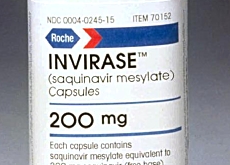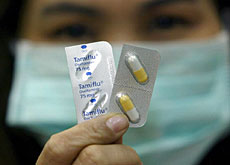Roche HIV drug move greeted with scepticism

Swiss pharmaceutical giant Roche said on Thursday it would help generic drug makers in the developing world produce versions of HIV drug saquinavir.
But the Swiss non-governmental organisation, the Bern Declaration, has criticised the move, calling it a public relations exercise.
In a statement, Roche said it would offer manufacturers in sub-Saharan Africa and the world’s Least Developed Countries the technical expertise to make generic versions of the drug, as part of its new Technology Transfer Initiative.
These countries cover 69 per cent of all people with HIV or Aids worldwide, said Roche.
Saquinavir is a so-called “second-line” (support) treatment which is recommended by the Geneva-based World Health Organization (WHO) to treat the HIV virus, which can lead to Aids. It is sold under the Invirase brand name.
Campaigners have been calling on drug companies to offer second-line treatment at lower prices, following discounts on first-line products.
William Burns, chief executive officer of Roche’s pharmaceuticals division, said the step was “unlike any initiative undertaken by Roche, to help ensure that the right medicines in the right formulation are available locally”.
Roche says it is the first pharmaceuticals firm to undertake such a move.
A new Roche team is being established and will be operational from the second quarter of this year. It will be based partly on the ground in Africa, and partly at Roche’s global headquarters in Basel, said the company.
Unconvinced
But the Bern Declaration said on Thursday that it was unconvinced by Roche’s announcement.
The NGO’s Julien Reinhard was quoted by the Swiss news agency as saying that it appeared to be a PR move.
“This decision is coming a bit late because saquinavir’s patent is starting to expire in an increasing number of countries,” said Reinhard.
Furthermore, most of the countries named by Roche – with the exception of South Africa and Bangladesh – don’t have the capacity to manufacture medications, he added.
He said it would have been better for Roche to renounce its patents in these countries.
Reinhard also claimed that saquinavir was never prescribed on its own, but usually in combination with the drug Ritonavir, which is manufactured by Abbott. He questioned the merits of manufacturing saquinavir alone.
When contacted by swissinfo about the Bern Declaration’s comments, Roche spokesman Baschi Dürr said: “For several years our policy has been to not file patents for our medicines in countries that are defined by the United Nations as Least Developed Countries.
“Furthermore, in countries that don’t have the capacity to produce medications, Roche sells its products at cost price.”
swissinfo with agencies
Saquinavir, whose brand name is Invirase, is recommended by the WHO to treat the HIV virus.
Saquinavir is a protease inhibitor, one of a class of drugs which works by blocking part of the virus and preventing it from replicating itself.
Protease inhibitors are used in combination with other anti-HIV drugs in treatment cocktails which aim to reduce the amount of HIV in the body.
Roche is based in Basel and is one of the world leaders in pharmaceuticals and diagnostics.
It employs 65,000 people in more than 150 countries.
In the first half of 2005, Roche recorded sales of SFr16.6 billion (+14%) ($12.9 billion) and a net income of SFr3.2 billion (+4%).
The offer to help produce generic HIV drugs concerns around 60 of the world’s poorest countries.

In compliance with the JTI standards
More: SWI swissinfo.ch certified by the Journalism Trust Initiative










You can find an overview of ongoing debates with our journalists here . Please join us!
If you want to start a conversation about a topic raised in this article or want to report factual errors, email us at english@swissinfo.ch.